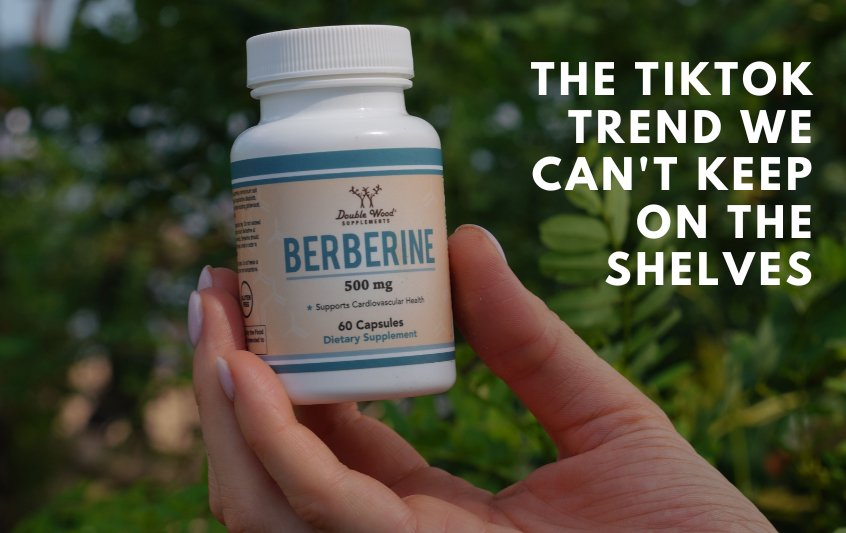Weight Loss fads come and go with Ozempic being the latest trend in the spotlight (thanks TikTok) and favored among celebrities alike. For those who don’t know, Ozempic (semaglutide), a GLP-1 receptor agonist, is typically prescribed for the treatment of type 2 diabetes. Even more recently, Ozempic and Berberine have gained attention for their potential in promoting weight loss. But does it really deliver the same results as the pharmaceutical alternative? Let’s take a deep dive into the mechanisms behind the weight loss effects of Ozempic and Berberine, exploring potential similarities and shedding light on their scientific foundations.
Ozempic (Semaglutide):
Ozempic belongs to the class of glucagon-like peptide-1 (GLP-1) receptor agonists. It is primarily prescribed for managing type 2 diabetes but has demonstrated notable weight loss effects in clinical trials. The mechanism involves GLP-1 receptor activation, leading to increased insulin secretion, decreased glucagon release, and delayed gastric emptying. These actions contribute to reduced appetite and caloric intake, ultimately facilitating weight loss [1].
Berberine:
Berberine, a naturally occurring compound found in several plants, has been studied for its diverse health benefits, including supporting a healthy metabolism. Research suggests that berberine may impact various metabolic pathways. It can activate adenosine monophosphate-activated protein kinase (AMPK), a key regulator of cellular energy balance. AMPK activation enhances glucose uptake and fatty acid oxidation, contributing to improved insulin sensitivity and may result in potential weight loss [2].
Similarities in Weight Loss Mechanisms:
While Ozempic and berberine belong to different classes of compounds, certain overlapping mechanisms may help explain their weight loss effects:
GLP-1 Receptor Activation:- Ozempic directly activates GLP-1 receptors, suppressing appetite and promoting weight loss [1].
- Berberine may indirectly affect GLP-1 secretion and receptor sensitivity, contributing to appetite control [3].
- Both Ozempic and berberine impact metabolic pathways.
- Ozempic through GLP-1 receptor activation, which influences insulin and glucagon levels [1].
- Berberine through AMPK activation, promoting glucose and lipid metabolism [2].
Ozempic and berberine, even with their differences, exhibit similarities in promoting weight loss through GLP-1 receptor activation and metabolic regulation. While Ozempic is a prescribed pharmaceutical, berberine is an alkaloid derived from plants making it a natural alternative.
However at the end of the day, berberine is not nature’s Ozempic. It may support cardiovascular health, metabolism and healthy cholesterol levels when combined with a healthy diet and regular exercise. You need to keep in mind that everyone’s body is unique and individual responses may vary. Given how new this trend is, further research is needed to fully understand the nuances of their weight loss effects. Before incorporating either into a weight loss regimen, we always recommend consulting with a healthcare professional to ensure safety and efficacy.
Citations:
- Davies MJ, Bergenstal R, Bode B, et al. Efficacy of Liraglutide for Weight Loss Among Patients With Type 2 Diabetes: The SCALE Diabetes Randomized Clinical Trial. JAMA. 2015;314(7):687-699. doi:10.1001/jama.2015.9676
- Zhang M, Wang C, Wang C, et al. Berberine protects against palmitate-induced endothelial dysfunction: involvements of upregulation of AMPK and eNOS and downregulation of NOX4. Mediators Inflamm. 2013;2013:260464. doi:10.1155/2013/260464
- Zhang X, Zhao Y, Xu J, Xue Z, Zhang M, Pang X, et al. Modulation of gut microbiota by berberine and metformin during the treatment of high-fat diet-induced obesity in rats. Sci Rep. 2015;5:14405. doi:10.1038/srep14405

